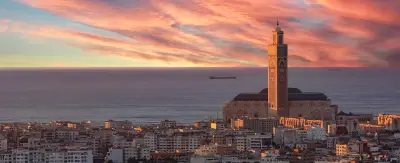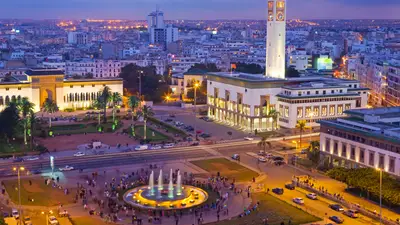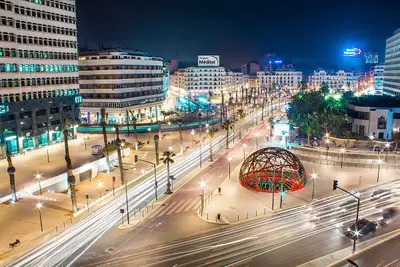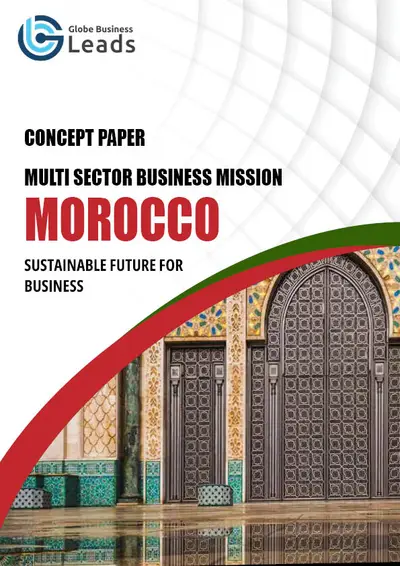MOROCCO: Sustainable Future for Business
Globe Business Leads (GBL) proudly presents an unparalleled business mission to Morocco, in collaboration with esteemed Moroccan business associations and chambers of commerce, we have meticulously crafted a comprehensive program designed to showcase Morocco's robust economy, diverse sectors, and attractive incentives. This mission is more than just a business trip; it is a gateway to unlocked potential of a leading destination for international trade and investment in Africa and beyond. Themed "Sustainable Future for Business", this landmark event is scheduled to take place in 2025 in the vibrant city of Casablanca, Morocco's economic powerhouse. This carefully chosen theme reflects Morocco's commitment to sustainable development and the long-term vision that underpins its economic strategies.
What to expect
- Pre-arranged B2B Meetings: Our carefully selected B2B meetings will connect you directly with potential Moroccan partners, customers, and suppliers, ensuring that your interactions are aligned to your business goals. These meetings provide an excellent platform for negotiating deals, exploring partnerships, and expanding your market presence.
- High-Level Networking Events: Throughout the mission, you'll have the chance to participate in various networking events, engaging you directly with industry leaders, government officials, and key stakeholders in Morocco’s business community. These interactions will offer insights and connections that could be pivotal for your success in the Spanish market.
- Sector-Specific Insights: Our expert-led workshops and panel discussions will give you a detailed understanding of the market dynamics in the country’s most promising sectors. Learn about emerging trends, regulatory landscapes, and growth opportunities in textiles, agriculture, and furniture, allowing you to make informed business assessments.
- Site Visits to industrial hubs: Gain a unique, on-the-ground perspective by visiting leading industrial hubs. These visits will provide you with deeper insights of innovative production techniques and sustainable practices, helping you see how you can incorporate these into your own business strategies.
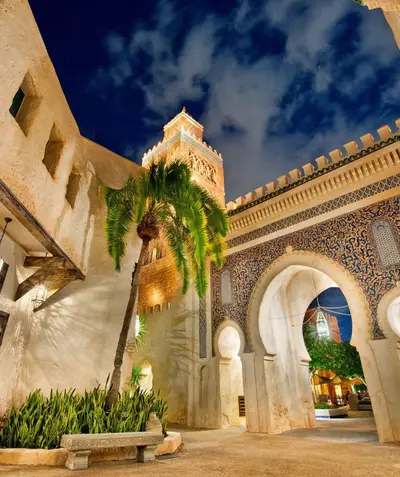
why Morocco?
Morocco, a land of rich history and vibrant culture, has emerged as a beacon of opportunity, offering a compelling narrative of growth, innovation, and sustainability. As the world seeks new horizons for business expansion and investment, Morocco stands ready to welcome global traders, and industry leaders with open arms, presenting a landscape ripe with potential and promise.
Morocco’s rise as an economic hub is the result of strategic planning and forward-thinking policies. The government has enacted reforms that streamline regulations, reduce financial barriers, and provide attractive incentives for businesses. Moreover, Morocco is positioning itself as a gateway between Africa, Europe, and the Middle East. Mega-projects like the Tanger Med port have turned the country into a global logistics hub, connecting markets across continents. Meanwhile, the development of smart cities like Mohammed VI Green City highlights Morocco’s commitment to sustainability and future-proofing its urban environments.
The country has free trade agreements with the United States, the European Union, and other countries that provide duty-free access to markets. Morocco is also home to several free zones and industrial parks, which offer incentives to businesses looking to establish a presence in the country. These zones provide tax exemptions, simplified procedures, and other benefits to businesses, making it easier to set up and operate a business in Morocco.
Key Sectors to Explore
Morocco's economy is not built on a single pillar but is a robust structure supported by multiple thriving sectors, each offering unique opportunities for growth and investment. This mission will take through these key sectors, providing in-depth insights into their current state, future projections, and the myriad opportunities they present for international businesses.
Automotive
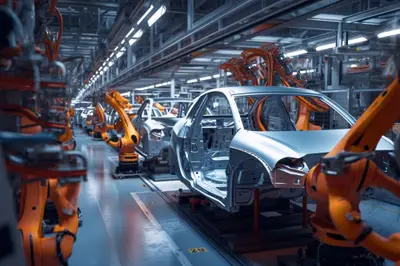
The automotive sector, which has grown dramatically in Morocco, particularly in the last decade, with significant export performance and job creation. The sector is expanding rapidly and significantly, and the efforts to attract investment in this sector were through the establishment of free zones, a streamlined environment, and tax incentives, which significantly contributed to this increase. This also reflects the fact that Morocco has become a manufacturing hub for well-known global automakers.
Morocco has been able to boost its production in this sector by combining these two drivers (exports and investment), which is a solid sign for the country’s distinguished edge. The Moroccan automotive sector is regarded as a strategic sector for the economy. It has grown at an exponential rate, allowing Morocco to become the leader in Africa in terms of automotive manufacturing, assembling, and exports. The performance of this sector reflects the Moroccan government’s efforts through accelerated industrialization plans, which drive the development of the rest of the economy in various ways.
Renewable Energy
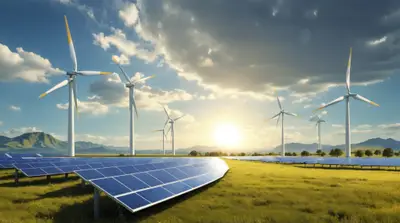
In the vibrant landscape of North Africa, Morocco stands out as a progressive leader in renewable energy, marking a paradigm shift from traditional energy reliance to a greener, sustainable future. With a strategic focus on solar and wind energy, the country is rapidly evolving into a powerhouse of renewable energy, offering vast opportunities for investors and stakeholders.
Morocco’s energy policy, spearheaded by ambitious renewable energy targets, aims to produce 52% of its electricity from renewable sources by 2030. This visionary approach is driven by the country’s commitment to sustainable development and climate change mitigation. The national strategy places a significant emphasis on solar and wind projects, reflecting Morocco’s geographical advantages and the global trend towards renewable energy.
Agriculture and Food Production

Agriculture is by far the largest employer in Morocco; around 38% of the workforce are employed in the sector. The cultivation of wheat and barley represents the most important pillar of Moroccan agriculture, accounting for around 75 percent of the arable land. Furthermore, the cultivation of citrus fruits (mandarins, oranges, and lemons) and their export to the European Union is an influential source of income for the economy.
There is significantly modernization in the agriculture sector, which makes it more favorable for private sector and international businesses. The modernization processes work on achieving two targets: agricultural value chains with a high degree of value creation (milk, meat, grain processing). The second target aims to strengthen the productivity and added value of small farmers in rural areas through mostly government initiatives and programs.
Textile and Apparel

The textile and apparel industry in Morocco represents a perfect blend of traditional craftsmanship and modern manufacturing techniques. This sector has long been a cornerstone of Morocco's industrial base and continues to evolve, adapting to global trends and consumer demands. Morocco's strategic location, just a stone's throw from European fashion capitals, combined with its well-developed logistics infrastructure, enables fast response times and efficient delivery to key markets. This proximity allows Moroccan textile companies to compete effectively in the fast-paced world of fashion, where speed to market is often as crucial as the quality of the product.
Morocco's textile industry is also gaining recognition for its increasing adoption of eco-friendly practices and sustainable production methods. This commitment to sustainability aligns with global trends and positions Morocco as a preferred partner for environmentally conscious brands and consumers.
Information and Communication Technology

Morocco is adopting digital technologies and transforming various sectors of the economy, driven by increasing digital capabilities and universal connectivity. The government is nearing completion of its digital transformation strategy, "Maroc Digital 2030". This initiative targets the creation of 300,000 jobs in the digital sector by 2030. In addition, the strategy includes provisions to expand Internet and telephone services, especially in rural regions. The emphasis lies on deploying fiber optics and transitioning to 5G technology in the medium term.
This robust digital infrastructure provides a solid foundation for the growth of technology-based businesses and the development of innovative digital solutions. Moreover, the government's focus on digital transformation, as outlined in various national strategies, creates numerous opportunities for businesses in areas such as e-government services, smart city solutions, and digital education platforms.
Who Should Attend?
The mission is tailored to cater to a diverse audience of international stakeholders, each with unique interests and objectives. For presidents, CEOs, and directors of Chambers of Commerce worldwide, this mission offers insights into how Morocco is fostering trade and accelerating economic growth, providing valuable lessons that can be applied in other contexts. Leaders of Investment Promotion Agencies will find in Morocco a case study of successful strategies for attracting and facilitating foreign investment.
C-Suite executives across various industries will discover new avenues for growth and innovation, whether through establishing operations in Morocco, partnering with local companies, or tapping into new supply chains. International Trade Directors will gain in-depth knowledge of Morocco's import and export landscape, including its free trade agreements and logistical capabilities. VIPs with trade or business interests in Morocco will have the opportunity to deepen their understanding of the market and make valuable connections to guide their business decisions.
